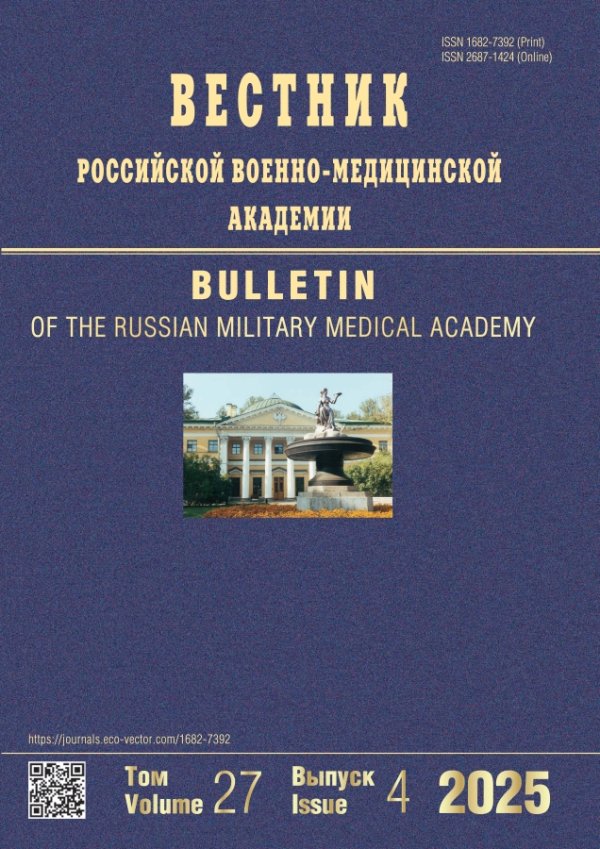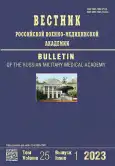Пути повышения эффективности циторедутивных оперативных вмешательств у больных, страдающих осложненными диссеминированными опухолями брюшной полости и малого таза
- Авторы: Нгуен В.1, Просветов В.А.1, Бромберг Б.Б.1, Дымников Д.А.1, Логинов В.А.1, Демко А.Е.1,2, Соловьев И.А.1,3, Суров Д.А.1,2
-
Учреждения:
- Военно-медицинская академия имени С.М. Кирова
- Санкт-Петербургский научно-исследовательский институт скорой помощи имени И.И. Джанелидзе
- Городская Мариинская больница
- Выпуск: Том 25, № 1 (2023)
- Страницы: 23-32
- Раздел: Оригинальное исследование
- URL: https://journals.rcsi.science/1682-7392/article/view/134083
- DOI: https://doi.org/10.17816/brmma120006
- ID: 134083
Цитировать
Аннотация
Обосновывается целесообразность выполнения двухэтапных циторедуктивных вмешательств у больных, страдающих осложненными диссеминированными опухолями брюшной полости и малого таза. Обследованы 92 пациента, страдающих осложненными диссеминированными опухолями брюшной полости и малого таза, которые были распределены на две группы. Основную группу составили 33 пациента, при хирургическом лечении которых была применена тактика двухэтапной циторедуктивной хирургии. В контрольную группу вошли 59 больных, которым были выполнены одноэтапные циторедуктивные операции. В структуре жизнеугрожающих осложнений у больных обеих групп преобладали некроз первичной опухоли (15 в основной и 31 в контрольной группе) и нарушение кишечной проходимости (12 и 16 соответственно). Средний индекс коморбидности Charlson составил 7,85 ± 1,37 и 7,53 ± 1,5 балла соответственно. Анестезиологический риск III–IV степени по классификации Американского общества анестезиологов выявлен у 23 (69,7 %) больных основной группы и у 45 (76,27 %) контрольной. Функциональный статус по шкале Восточной кооперативной онкологической группы, равный 2–3 баллам, установлен у 23 (69,7 %) и 46 (77,9 %) пациентов основной и контрольной групп соответственно. Отмечены высокие показатели индекса перитонеального канцероматоза, которые были достоверно выше у пациентов основной группы — 13,1 ± 6 против 9,9 ± 4,8 балла у больных контрольной группы (p = 0,012). Сравнительный анализ полученных результатов лечения больных основной и контрольной групп продемонстрировал, что тактика двухэтапных циторедуктивных оперативных вмешательств позволяет уменьшить частоту послеоперационных осложнений в первую очередь III–IV степени по Clavien — Dindo, с 40,7 до 18,2% (p = 0,049) и летальность с 16,9 до 9,1 % (p = 0,468), а также увеличить частоту достижения полной циторедукции с 49,1 до 90,9 % (p = 0,002) и частоту выполнения внутрибрюшной гипертермической химиоперфузии с 40,7 до 93,9 % (p < 0,001). Таким образом, двухэтапные циторедуктивные оперативные вмешательства являются безопасным и эффективным тактическим решением в хирургическом лечении больных, страдающих осложненными диссеминированными опухолями брюшной полости и малого таза.
Полный текст
Открыть статью на сайте журналаОб авторах
Ван Тху Нгуен
Военно-медицинская академия имени С.М. Кирова
Автор, ответственный за переписку.
Email: thuhvqy@gmail.com
ORCID iD: 0000-0002-5546-2371
SPIN-код: 6895-5893
адъюнкт
Вьетнам, Санкт-ПетербургВадим Алексеевич Просветов
Военно-медицинская академия имени С.М. Кирова
Email: thuhvqy@gmail.com
ORCID iD: 0000-0002-5503-1598
SPIN-код: 1717-7735
ординатор
Россия, Санкт-ПетербургБорис Борисович Бромберг
Военно-медицинская академия имени С.М. Кирова
Email: thuhvqy@gmail.com
ORCID iD: 0000-0001-9940-7772
SPIN-код: 4567-6403
канд. мед. наук
Россия, Санкт-ПетербургДенис Александрович Дымников
Военно-медицинская академия имени С.М. Кирова
Email: thuhvqy@gmail.com
ORCID iD: 0000-0003-1644-1014
SPIN-код: 6945-7148
канд. мед. наук
Россия, Санкт-ПетербургВладимир Анатольевич Логинов
Военно-медицинская академия имени С.М. Кирова
Email: www.exclusive@mail.ru
ORCID iD: 0000-0002-2100-6087
SPIN-код: 8481-7599
канд. мед. наук, доцент
Россия, Санкт-ПетербургАндрей Евгеньевич Демко
Военно-медицинская академия имени С.М. Кирова; Санкт-Петербургский научно-исследовательский институт скорой помощи имени И.И. Джанелидзе
Email: demko@emergency.spb.ru
ORCID iD: 0000-0002-5606-288X
SPIN-код: 3399-8762
д-р мед. наук, профессор
Россия, Санкт-Петербург; Санкт-ПетербургИван Анатольевич Соловьев
Военно-медицинская академия имени С.М. Кирова; Городская Мариинская больница
Email: ivsolov@yandex.ru
ORCID iD: 0000-0001-9646-9775
SPIN-код: 6703-4852
д-р мед. наук, профессор
Россия, Санкт-Петербург; Санкт-ПетербургДмитрий Александрович Суров
Военно-медицинская академия имени С.М. Кирова; Санкт-Петербургский научно-исследовательский институт скорой помощи имени И.И. Джанелидзе
Email: thuhvqy@gmail.com
ORCID iD: 0000-0002-4519-0018
SPIN-код: 5346-1613
д-р мед. наук, доцент
Россия, Санкт-Петербург; Санкт-ПетербургСписок литературы
- Сахин В.Т., Маджанова Е.Р., Крюков Е.В., и др. Патогенетические особенности анемии у больных с солидными опухолями // Клиническая онкогематология. 2017. Т. 10, № 4. С. 514–518. doi: 10.21320/2500-2139-2017-10-4-514-518
- Ferguson H.J.M., Ferguson C.I., Speakman J., Ismail T. Management of intestinal obstruction in advanced malignancy // Ann Med Surg (Lond). 2015. Vol. 4, No. 3. Р. 264–270. doi: 10.1016/j.amsu.2015.07.018
- Нгуен В.Т., Бромберг Б.Б., Новикова М.В., и др. Двухэтапная циторедуктивная хирургия при осложненном прогрессирующем раке тонкой кишки // Вестник национального медико-хирургического центра им. Н.И. Пирогова. 2022. Т. 17, № 3. С. 142–147. doi: 10.25881/20728255_2022_17_3_142
- Sugarbaker P.H. Prevention and Treatment of Peritoneal Metastases: a Comprehensive Review // Indian J Surg Oncol. 2019. Vol. 10, No. 1. Р. 3–23. doi: 10.1007/s13193-018-0856-1
- Mehta S.S., Gelli M., Agarwal D., Goéré D. Complications of Cytoreductive Surgery and HIPEC in the Treatment of Peritoneal Metastases // Indian J Surg Oncol. 2016. Vol. 7, No. 2. Р. 225–229. doi: 10.1007/s13193-016-0504-6
- Sugarbacker P.Н., Chang D. Result of treatment of 385 patients with peritoneal surface of appendiceal malignancy // Ann Surg Oncol. 1999. Vol. 6, No. 8. Р. 727–731. doi: 10.1007/s10434-999-0727-7
- Yan T.D., Black D., Savady R., Sugarbaker P.H. Systematic review on the efficacy of cytoreductive surgery combined with perioperative intraperitoneal chemotherapy for peritoneal carcinomatosis from colorectal carcinoma // J Clin Oncol. 2006. Vol. 24, No. 24. Р. 4011–4019. doi: 10.1200/JCO.2006.07.1142
Дополнительные файлы











